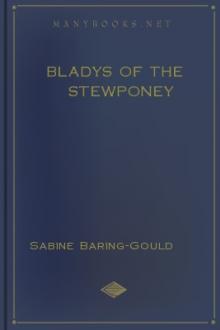The Broom-Squire - Sabine Baring-Gould (life books to read .txt) 📗

- Author: Sabine Baring-Gould
Book online «The Broom-Squire - Sabine Baring-Gould (life books to read .txt) 📗». Author Sabine Baring-Gould
"Never!" she said, firmly.
"But, look here," said the farmer, "if I did agree to take you, why, after a day or two, you'd be homesick, and wantin' to be back in the arms of Jonas. It's always so with women."
"I shall never go back," persisted Mehetabel.
"So you say. But before the week is out you'll be piping another song."
"You may bind me to stay--three months--six--a year,"
"That is all very well to say. Bind me, but how? What bind will hold--when the marriage tie does not?"
"The marriage tie would have held me till death," answered Mehetabel gravely, "if Jonas had not done that which makes it impossible for me to remain. It is not for my sake that I am away. Had I been alone I would have borne all till I died. But I have other duties now. I am a mother. Here is my darling, a charge from God. I owe it to God to do what I am here for--to find another home, a place away from the Punch-Bowl."
"What do you mean?"
"I cannot explain."
"Is the Punch-Bowl unhealthy for the child?"
"Yes, it would die there."
"Who told you so?"
"I know it. My heart says so."
"Now look here," said Colpus, getting red as a poppy, "there's a lot of talk in the place about you. Some say that Bideabout is in the wrong, some say that the wrong lies with you. It is reported that he beat you, and there are folks that tell as how you gave him occasion. You must let me know the right of it all, or I can't take you."
"Then I must go," said Mehetabel, "I cannot tell you all. You may think ill of me if you choose, I cannot help that."
Colpus rubbed his foxy whiskers and head.
"You're a won'erful active woman, and do more work than three ordinary gals. I'd like to have you in the house. But then--what am I to say if Kink comes to claim you?"
"Say you will not give me up."
"But I ain't so sure but what he can force me to surrender you."
"You are the strongest man in Thursley."
"'Tain't that," said Colpus, gratified by the compliment. "'Tis he might bring the law against me. I don't know nuthin' about law, though I'm constable, but I reckon, if I was to keep a cow of his as had strayed and refused to give her up, he could compel me. And what's true of a cow is true of a wife. If I could be punished for stealin' his goose I might be summonsed all on account of you. Then there's the babe--that might be brought in as kidnappin'! I daren't risk it."
"But, father," put in Polly. "How would it do for a time, just to try."
"There's something in that, Polly.
"And Julia Caesar have left things in a terrible mess. We must have all cleared up before another comes in. What if we take Matabel by the day to clear up?"
"Look here, Polly," said Colpus, who visibly oscillated in mind between his wishes to engage Mehetabel and his fears as to what the consequences might be. "It's this," he touched his forehead, and made a sign towards the applicant. "Folk do say it."
"Matabel," said the good-natured farmer's daughter, "you go along to Thursley, and father and I will talk it over. If we think we can take you--where shall we send to find you?"
"To Betty Chivers' house."
"Well, in half an hour I trust we shall have decided. Now go."
As Mehetabel withdrew, Polly said, "It's all gammon, father, about her not being right in her head. Her eye is as steady as the evenin' star. And it's all lies about there bein' any fault in her. Matabel is as honest and true as sunlight."
Then old Colpus shouted after Mehetabel, who was departing by the lane. "Don't go that way, over the field is the path--by the stile. There's a lot o' water in the lane."
The young mother turned, thanked him with an inclination of the head, and pressing her cheek to the child she bore, she took the path that crossed a meadow, and which led to a tuft of holly, near which was the stile, into the lane. She walked on, with her cheek resting on the child's head, and her eyes on the trodden, cropped wintry grass, with a flutter of hope in her bosom; for she was almost certain that with the influence of Polly engaged on her side, old Colpus would agree to receive her.
She did not walk swiftly. She had no occasion for haste. She hoped that the objections of the farmer would give way before she had reached the hedge, and that he would recall her.
She had almost arrived t the turf of holly, singing in a low tone to the child in her arms, when, a voice made her start and cry out.
She looked up. Jonas was before her.
Unobserved by her he had entered the field. From the lane he had seen her, and he had crossed the stile and come upon her.
She stood frozen to the spot. Each muscle became rigid; the blood in her arteries tingled as though bees were making their way through every vein. Her brows met in a black band across her face. She trembled for a moment, and then was firm. A supreme moment, the supreme moment in her life was come.
"So I have found you at last," sneered Jonas. Hatred, fury, were in him and sent a quiver through the tones of his voice.
"Yes, you have found me," she answered with composure.
"You--do you know what you have done? Made me a derision and a talk to all Thursley, a jest in every pot-house."
"I have not done this. It is your doing."
"Is it not enough that I have lost my money, but must I have this scandal and outrage in my home?"
She did not answer him. She looked steadily at him, and he dared not meet her eyes.
"You must come with me at once," he said.
"I will not go with you."
"I will make you."
"That you cannot."
"You are mad. You must be put under restraint."
"I will go to the madhouse, but not to the Punch-Bowl."
"You shall be forced to return."
"How?"
"I will have you tied. I will swear you are crazed. I will have you locked up, and I will beat you till you learn to obey and behave as I would have you."
"Jonas," said Mehetabel, "this is idle talk. Never, never will I go back to you."
"Never!"
He approached, his eyes glaring, his white fangs showing, like those of a dog about to bite.
Instinctively she put her hand into her pocket and drew forth a lump of ironstone, that she had brandished the previous evening before Sally Rocliffe and Giles Cheel; and which she carried with her as her only weapon of defence.
"Jonas," said Mehetabel. "You may threaten, but your threats do not move me. I can defend myself."
"Oh, with a stone? he scoffed.
"Yes, if need be with a stone. But I have better protection than that."
"Indeed--let me hear it."
"If you venture to touch me--venture to threaten any more--then I shall appeal for protection."
"To whom--to Iver?"
"Not to Iver," her heart boiled up, and was still again.
"To whom--to Farmer Colpus?"
"To the law."
"The law!" jeered Jonas. "It is the law that will send you back to me."
"It is the law which will protect me from you," answered Mehetabel.
"I am fain to learn how."
"How! I have but to go before a magistrate and tell how you tried to poison your own child--how, when that failed, you tried to smother it. And, Jonas," she added--as she saw his face grow ashen, and a foam bubble form on his lips--"and, Jonas," she stepped forward, and he backed--his glassy eyes on her face, "and, Jonas," she said, "look here, I have this stone. With the like of this you sought to kill me in the moor." She raised it above her head, "you would-be murderer of your wife and your child--I am free from you." She took another step forward--he reeled back and vanished--disappeared instantly from her sight with a scream--instantly and absolutely, as when the earth opened its mouth at the word of Moses and swallowed up Korah.
CHAPTER XLIV.
AGAIN: IRONSTONE.
Mehetabel heard shouts, exclamations, and saw Thomas Rocliffe and his son, Samuel, come up over the stile from the lane, and James Colpus running towards her.
What had happened? Whither had Jonas vanished? She drew back and passed her hand, still holding the ironstone, over her face.
Then she saw Thomas and Samuel stoop, kneel, and Thomas swing himself down and also disappear; thereupon up came the farmer.
"What is it? Has he fallen in--into the kiln?"
That the reader may understand what had occurred, it is necessary that a few words of explanation should be given.
At the time when the country was densely wooded with oaks, then the farmers were wont annually to draw chalk from the quarries in the flank of the Hog's Back, that singular ridge, steep as a Gothic roof, running east and west from Guildford, and to cart this to their farms. On each of these was a small brick kiln, constructed in a sand-bank beside a lane, so that the chalk and fuel might be thrown in from above, where the top of the kiln was level with the field, and the burnt quicklime drawn out below and shovelled into a cart that would convey it by the road to whatever field was thought to require such a dressing.
But fuel became scarce, and when the trees had vanished, then sea coal was introduced. Thereupon the farmers found it more convenient to purchase quicklime at the kiln mouth near the chalk quarry, than to cart the chalk and burn it themselves.
The private kilns were accordingly abandoned and allowed to fall to ruin. Some were prudently filled in with earth and sand, but this was exceptional. The majority were allowed to crumble in slowly; and at the present day such abandoned kilns may be found on all sides, in various stages of decay.
Into such a kiln, that had not been filled in, Jonas had fallen, when he stepped backwards, unconscious of its existence.
Polly Colpus had followed her father, but kept in the rear, alarmed, and dreading a ghastly sight. The farmer bent with hands on his knees over the hole. Samuel knelt.
"Have you got him?" asked Colpus.
"Lend a hand," called Thomas from below, and with the assistance of those above the body of Jonas Kink was lifted on to the bank.
"He's dead," said the farmer.
Then Mehetabel laughed.
The three men and Polly Colpus turned and looked at her with estrangement.
They did not understand that there was neither mockery nor frivolity in the laugh, that it proceeded involuntarily from the sudden relaxation of overstrained nerves. At the moment Mehetabel was aware of one thing only, that she had nothing more to fear, that her baby was safe from pursuit. It was this thought that dominated her and caused the laugh of relief. She had not





Comments (0)